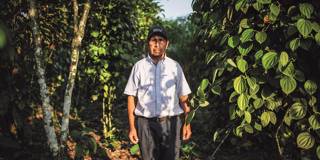Managing the climate crisis will require reducing the carbon footprint of our food and agricultural systems in the years ahead. To succeed, we should start focusing less on the interests of corporations, and more on the needs of farmers.
NEW DELHI – One out of every nine people goes to sleep hungry. The reason is not insufficient food supplies. It is that our food systems have made basic nutrition unaffordable and inaccessible. Worse, even though an estimated one-third of food is wasted, policymakers remain focused on boosting agricultural production – usually in ways that result in a larger portion of subsidies flowing to a handful of companies, rather than to support farmers.

NEW DELHI – One out of every nine people goes to sleep hungry. The reason is not insufficient food supplies. It is that our food systems have made basic nutrition unaffordable and inaccessible. Worse, even though an estimated one-third of food is wasted, policymakers remain focused on boosting agricultural production – usually in ways that result in a larger portion of subsidies flowing to a handful of companies, rather than to support farmers.